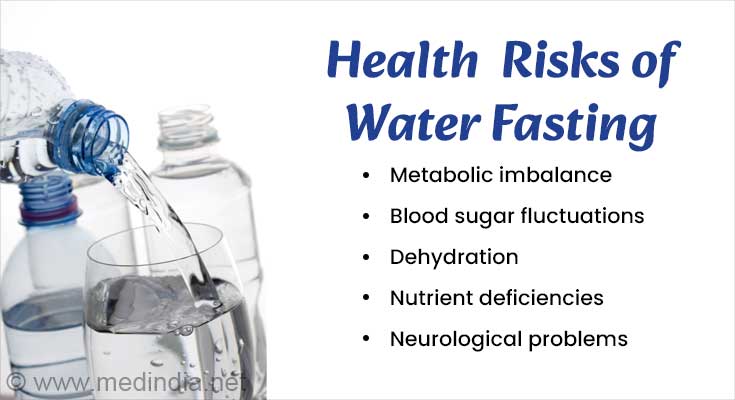Water fasting may lead to rapid weight loss, but it poses risks like nutrient deficiencies and metabolic issues, making it unsafe for long-term health.
- Water fasting causes temporary weight loss but leads to muscle loss and rapid weight gain
- Prolonged fasting poses health risks like metabolic imbalance, dehydration, and nutrient deficiencies
- A balanced diet with proper hydration is a safer and more sustainable way to stay healthy
Is Water-Only Fasting Safe?
Go to source).
Water Fasting: What It Is and Why People Try It
Fasting is followed as a part of religious tradition and has been incorporated into our lives for thousands of years. People on social media are promoting water fasting for its health benefits like weight loss, reducing cancer risk, and type 2 diabetes. However, there is no proven evidence.There are no rules for a water fast as there isn’t enough research to establish safety guidelines. It is important to know that a water fast is not the same as a liquid diet. A water fast can range between 2 to 41 days with an average of around seven days.
Most of the research on water fasting was conducted on a small number of participants and closely monitored from fasting to getting back into their regular diet.
How Water Fasting Affects Your Body
The participants are sometimes given enemas to clear their guts to regulate their poop cycle and they often spend time at a spa to get massages. They aren’t usually at home managing it alone. In other studies with controlled water fasting, participants consumed two to three liters daily than the recommended daily water intake.While the participants were young and healthy without any kidney disease, they were observed with multiple metabolic problems and if undetected it could lead to serious neurological complications and fatal. It is recommended to water fast for one day as a zero-calorie alternate-day fasting instead of a multiple-day water fast.
A water fast will only lead to muscle loss rather than fat loss. When there is not enough protein, our body starts to break down muscles which can develop into nutrient deficiencies. It can sometimes end up with an eating disorder. It might change our psychology around food if there is no calorie intake for 30 days.
Health Effects of Eating After a Long Water Fast
It can be potentially dangerous to eat food after a water fast. When we re-feed after 20 days of water fasting, the body doesn’t know how to metabolize glucose, fat, and other compounds. It is more harmful to a person with a metabolic problem like type 2 diabetes.Complications of water fasting are low or high blood sugar, fatigue, arthritis, constipation, colitis, gastritis, thyroid problems, depression, headache, seizures, and death. A recent study has revealed that water fasting can lead to dehydration and a reduction in sodium levels.

Why Hydration is Important More Than Water Fasting
The body requires electrolytes to keep sodium levels stable, and are obtained from fruits and vegetables. Thirst is an indicator of dehydration. It is a feedback mechanism from special receptors in the hypothalamus of the brain.These receptors detect a higher concentration of salt or sodium in the bloodstream triggering the receptors to make you feel thirsty leading to fluid intake. It also releases ADH (antidiuretic hormone) that stimulates re-absorption of water by the kidney to lower your serum sodium.
Water fasting is not a healthy way of losing weight for most people, especially for a long time. Drinking water when you feel hungry can be very dangerous as it can lower sodium levels in the blood (hyponatremia). A balanced diet is a safer way to boost your health.
Reference:
- Is Water-Only Fasting Safe? - (https://pmc.ncbi.nlm.nih.gov/articles/PMC8369953/)
Source-Medindia















